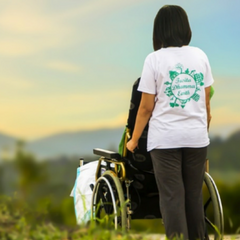
We Must Recognise the Carers Sacrificing Their Own Health for Others
Did you know there are 5.4 million people in the UK who provide care for a friend or family member? I bet you didn’t know that this group of people are twice as likely to suffer from poor health as the rest of the population. Caregiving is hard, and it’s time caregivers got the recognition they deserve. This month is National Family Caregivers Month, and we need to use it to highlight the strains so many people are under.

These people are unpaid, and they do it because their loved ones would not be able to cope without them. Such self-sacrifice is routine for many individuals and families, and the NHS relies on family members and friends to deliver home based care and support. It can be looking after people with mental illness, physical disability, disease and palliative care. They receive, in many, cases, little or no assistance from the government.
Shocking facts
- The Government’s State of Caring survey into the roles and wellbeing of caregivers revealed 84% of carers had suffered ill health as a result of caring for loved ones.
- Ill health as a result from care giving rose 10% from the previous year. The health risks include increased risk of stroke and heart disease, especially amongst spouses.
- 64% of carers identify direct correlation between their poor health and lack of support from the government.

Caregiver Dads are suffering
Despite changing societal attitudes about gender roles, men still feel an overwhelming pressure to provide for and support their children. The crushing sense of pressure and responsibility can be too much at times. 42% of all unpaid carers in the UK are men.
Young carers are forgotten
There are 700,000 young carers in the UK, that is to say children under the age of 18, looking after family members. Half have little or no help at all, and half miss on average 48 days of school a year. Those aged 16-18 are twice as likely to be unemployed. Aside from growing up to fast with unreasonable responsibilities, child care givers are sacrificing their hope for a positive future.
Older carers are unable to cope
Over a million of the UK’s carers are over 65, 65% of whom have physical or mental disability themselves. 68.8% have suffered mental health problems due to the pressures of being primary care giver. As if that wasn’t enough, 1/3 have been forced to cancel medical treatment or operations to care for their loved one.
Greater support for carers is crucial
The sad irony is that many of our 5.4 million carers are themselves vulnerable. They include the elderly, people with mental health issues and children. The reality is that many carers end up requiring medical treatment for mental health and psychological issues as a direct result of the pressures of being a primary care giver. This places greater strain on the NHS, which could be avoided by allocating greater resources in the first place. The first step is recognition of the stress that primary care givers face.
For more information on care givers and useful resources take a look at the following websites:
https://www.carersuk.org/news-and-campaigns/state-of-caring-survey-2016
http://www.nhs.uk/conditions/social-care-and-support-guide/Pages/what-is-social-care.aspx
National Family Caregivers Month
